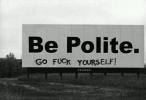If you play blackjack and are tired of losing money, read this thread.
Note that the information here will not automatically make you a winning blackjack player. Note that showing a profit in blackjack can sometimes take a long time, as the edge is small and the variance is high. However, you can greatly improve your odds in blackjack by just taking a small amount of time to learn the basics of card counting.
First, learn basic strategy. Basic strategy is the "correct" strategy that nearly everyone (at least everyone besides complete morons) bases their play upon. You know... stuff like hitting 12 versus a dealer's 2 or 3, but not against 4 through 6.
Next, read the following article that teaches you how to count cards:
http://www.bj21.com/bj_reference/pages/9541.html
(Do not read further until you have done the above.)
------------------------------------------------------------------------------------
Next, memorize the following exceptions to basic strategy based upon the count (in order of importance):
1) If the true count is at least +3, take insurance against an ace (regardless of what hand you hold).
2) If the true count is zero or positive, stand on 16 versus a dealer 10.
3) If the true count is at least +4, stand on 15 versus a dealer 10.
4) If the true count is at least +2, stand on 12 versus a dealer 3.
5) If the true count is at least +3, stand on 12 versus a dealer 2.
6) If the true count is -1 or less, hit on 13 versus a 2.
7) If the true count is zero or negative, hit on 12 versus a 4.
There are many other modifications, but the above are the most important ones. If you don't want to memorize these, at least memorize #1 and #2, as they are easily the most important to gain edge. Keep in mind that I am also giving basic numbers here, and am not accounting for minor differences that occur when playing 6-deck shoe versus double-deck, etc.
Other strategy notes:
- Penetration (how far they deal before reshuffling) is very important. If they cut off more than 2 decks out of 6, or 1 out of 2, it is very difficult to play a +EV blackjack game, even if you are counting.
- The number of players matters. Try to get tables with few players, preferably one other person. Playing heads-up is great EV-wise, but bad in the sense that you get watched far more closely by the pit. If your table is full, your EV will go down, and you may not even be a favorite in a marginal game (i.e. mediocre penetration and/or mediocre rules).
- The rules matter. NEVER play the single deck where they pay 6:5 for blackjack. It is unbeatable. Also avoid any games where you can't double on any two cards. It is advisable, especially in shoe games, to only play games where you are allowed to double after splitting. It is always to the player's advantage to have the dealer stand on soft 17 (rather than hit it), but this is getting more difficult to find other than at high-end Vegas strip casinos. Don't obsess over the hit/stand soft 17 thing, but keep in mind that it makes a difference.
- Do not ever place sidebets on what cards will be dealt. The house has a HUGE edge on these.
- Stay true to yourself and be disciplined. It sucks when you slam out 5 big bets in a row when the count is high, lose all 5, and then the shuffle comes before you can get unstuck. It's tempting to keep firing big after the shuffle, but that move is -EV and will kill you in the long run if you don't get that impulse under control.
My next post will discuss the very important concept of "cover" -- i.e. making yourself NOT look like a counter.




 Reply With Quote
Reply With Quote


